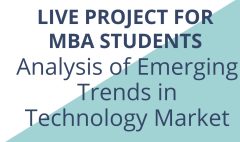Mastering Knowledge
Mastering Knowledge
Discover how MBA graduates are uniquely positioned to excel in the knowledge-based services sector, leveraging their comprehensive skills for strategic, managerial, and advisory success.
In the heart of the burgeoning knowledge economy, the demand for professionals who can navigate complex informational landscapes to drive business success is higher than ever. MBA graduates, with their multifaceted skill set, stand at the forefront of this domain, poised to make significant impacts in various sectors of knowledge-based services. From strategic consulting to financial advice, the opportunities are as diverse as they are rewarding.
The Knowledge Economy and MBAs: A Perfect Symbiosis
The knowledge economy thrives on the generation, management, and utilization of knowledge to create value. This economy prizes intellectual capabilities over traditional capital, making human intellect the leading force in wealth creation. In this environment, MBA graduates shine due to their analytical prowess, strategic thinking, and leadership abilities. Their training prepares them to manage complex projects, lead diverse teams, and make data-driven decisions, skills that are crucial in knowledge-intensive activities.
Strategic Consulting: Providing Valuable Insights
One of the most prominent fields where MBAs excel is strategic consulting. Organizations seek the expertise of consultants to gain valuable insights into their operations, competitive landscape, and industry trends. MBA graduates are equipped with a broad understanding of various industries, analytical skills, and the ability to formulate effective strategies, making them ideal for roles in consulting.
Financial Advisory: Navigating Fiscal Complexities
Another sector where MBA graduates are invaluable is financial advice. Their understanding of market dynamics, corporate finance, and economic indicators positions them to provide guidance on investments, risk management, and financial planning. They can translate complex market data into actionable strategies, helping organizations navigate fiscal complexities with confidence.
Managerial Roles: Leading with Knowledge
Knowledge-based services also require strong leadership to manage intellectual assets effectively. MBA graduates are trained in organizational behavior, leadership ethics, and team management, preparing them to lead knowledge-intensive teams. They’re adept at motivating teams, optimizing workflows, and ensuring that knowledge resources are used efficiently and ethically.
Continual Learning: The Key to Knowledge-Based Success
In the ever-evolving landscape of the knowledge economy, continual learning is non-negotiable. MBA programs emphasize the importance of staying abreast of industry trends, technological advancements, and socio-economic developments. This culture of continual learning is what keeps MBA graduates relevant and in demand in the knowledge-based services sector.
Resources for Aspiring Knowledge Masters
- McKinsey & Company Insights (https://www.mckinsey.com/insights): A treasure trove of articles, podcasts, and reports on various sectors, perfect for those looking into strategic consulting.
- Harvard Business Review (https://hbr.org/): An essential resource for the latest in management best practices, innovative strategies, and industry trends.
- Financial Times (https://www.ft.com/): Stay updated with global market trends, economic indicators, and financial news.
- Coursera (https://www.coursera.org/): Offers courses on knowledge management, financial markets, strategic leadership, and more, ideal for continual learning.
Embarking on a career in knowledge-based services post-MBA is not just a path to personal success and fulfillment; it’s a journey that can have profound impacts on industries, economies, and societies. By mastering the art of leveraging knowledge, MBA graduates are not only carving a niche for themselves in the corporate world; they are shaping the future of the global economy.








